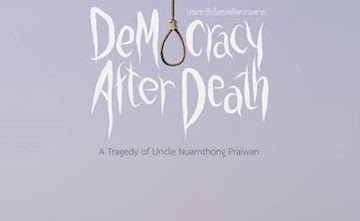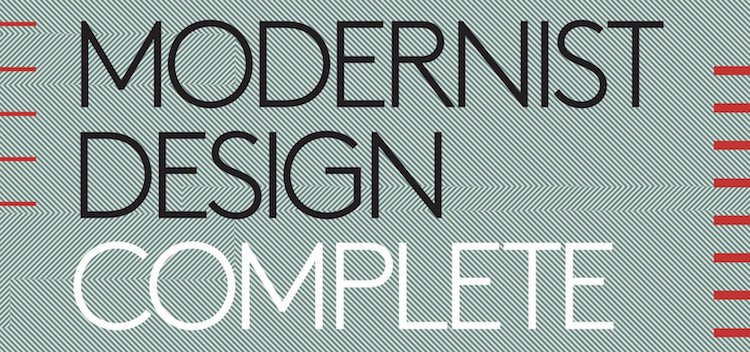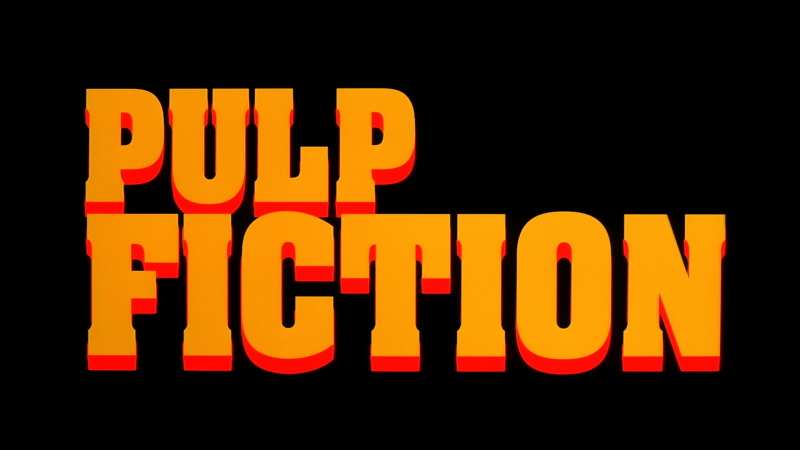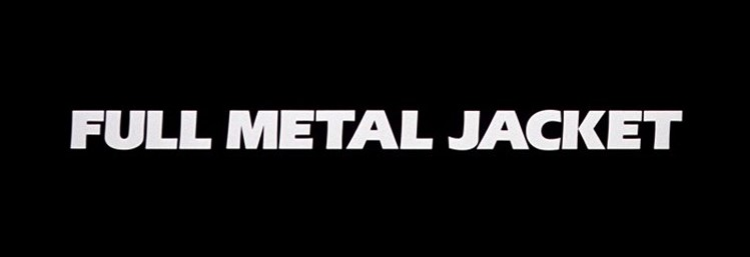14 October 2018
Doc Club Theater
12 October 2018
Ghost:2561
The liminality between sleeping, dreaming, and wakefulness is a recurrent theme in Apichatpong's work. He filmed his boyfriend asleep on three consecutive nights for Teem, and Dilbar shows a construction worker sleeping. Sleep is also central to Apichatpong's most recent feature film, Cemetery of Splendour (รักที่ขอนแก่น), and his segment of the new portmanteau film Ten Years Thailand (Song of the City). The fire in Blue has echoes of his Primitive installation project, such as the burning football in Phantoms of Nabua (ผีนาบัว).
Blue, showing at Bangkok's Gallery VER, is projected onto a large glass screen, hanging in the centre of the darkened gallery. This produces reflections of the images on the walls and floor, highlighting the film's theatricality and demonstrating Apichatpong's continued fascination with (and mastery of) the effects of light.
09 October 2018
1001 Movies
You Must See Before You Die
The new films in the 2018 edition are: The Handmaiden; Lady Macbeth; Lady Bird; The Shape of Water; Three Billboards Outside Ebbing, Missouri; Call Me by Your Name; Mother!; Blade Runner 2049; Get Out; and Black Panther. While these choices are all justified though predictable, the documentary Dawson City: Frozen Time is a more surprising addition. The deleted films are: No Man's Land; The Consequences of Love; Tsotsi; Lincoln; The Revenant; Hell or High Water; The Jungle Book (the Jon Favreau version); Jackie; Manchester by the Sea; I, Daniel Blake; and Arrival.
07 October 2018
"The Washington Times
retracts it in its entirety..."
In a Washington Times op-ed published on 2nd March (page B3), James Lyons stated the conspiracy theory as a fact, implicating both Seth and Aaron Rich in the DNC email leak: "Interestingly, it is well known in the intelligence circles that Seth Rich and his brother, Aaron Rich, downloaded the DNC emails and was paid by Wikileaks for that information." [Aside from its defamatory nature, the sentence has at least three grammatical errors.]
The newspaper has since deleted the article (headlined "More cover-up questions") from its website. It has also issued a retraction, disavowing the op-ed's allegations about the Rich brothers: "The Washington Times now does not have any basis to believe any part of that statement to be true, and The Washington Times retracts it in its entirety."
03 October 2018
Internet Universality Beyond Words
The centrepiece is Watch!, a dramatic paper sculpture by Wee Viraporn. From a distance, it's a pixelated representation of Prayut Chan-o-cha's eyes, implying that the Prime Minister is monitoring Thai citizens' online activities. On closer inspection, each pixel is a cube featuring pictures of Thai military and junta controversies, such as the GT200 corruption scandal and the cover of Time's 2nd July issue (a Prayut interview that the magazine's distributors withheld from Thailand).
The most interesting work is much less conspicuous: a video playing on an iPhone. This short film, by Tewprai Bualoi, is a montage of online memes taken from cartoons and news clips (including extracts from Charnvit Kasetsiri's documentary 14 ตุลา), and even its title is a meme: Friendship Ended with Mudasir Now Salman Is My Best Friend (มิตรภาพสิ้นสุดกับ Mudasir ตอนนี้ Salman คือเพื่อนที่ดีที่สุดของฉัน).
Tewprai's film uses codes and metaphors that refer to the 6th October 1976 massacre. A photo of director Nawapol Thamrongrattanarit, the Red Bull logo, and the Scout emblem refer respectively to Nawaphon, the Red Gaurs, and the Village Scouts (the three militia groups that instigated the violence). It also includes a clip from The Simpsons (broadcast on 1st December 1996) of Bart hitting Homer with a chair, in reference to Neal Ulevich's photograph of a man preparing to attack a corpse in the same way. There are also split-second shots of the gate in Nakhon Pathom from which two pro-democracy activists were hanged.
02 October 2018
Thai Politics III
01 October 2018
Concept, Context, Contestation
30 September 2018
Leonard Maltin's Movie Guide:
The Modern Era
The book includes capsule reviews of films released since 1965, along with selected older classics. Most pre-1965 reviews were moved to a different book, the Classic Movie Guide, though this resulted in some duplication and inconsistency. Many pre-1965 films are reviewed in both The Modern Era and the Classic Movie Guide, and The Modern Era's cross-referencing to the Classic Movie Guide seems arbitrary. Also, foreign-language films are listed only by their English titles, with no alternative title index.
The annual film guide is now a thing of the past, as the last remaining example, the Radio Times Guide to Films 2019, had its publication cancelled this week. (The Guide to Films 2018, published last year, is now the final edition.) Maltin's closest UK equivalent, Leslie Halliwell's phone-directory-sized Film Guide, ended ingnominiously in 2008 as The Movies that Matter. The superb Time Out Film Guide ceased publication in 2012. The Virgin Film Guide and Empire Film Guide, both offering longer reviews of fewer films, ended in 2005 and 2007, respectively.
23 September 2018
Democracy after Death:
The Tragedy of Uncle Nuamthong Praiwan

Neti Wichiansaen’s documentary Democracy after Death: The Tragedy of Uncle Nuamthong Praiwan (ประชาธิปไตยหลังความตาย เรื่องเศร้าของลุงนวมทอง) is an account of Thailand’s recent political history, bookended by the coups of 2006 and 2014. These events are narrated in a voiceover addressed to Nuamthong Praiwan, a pro-democracy protester who committed suicide in 2006. Nuamthong was also the subject of Prap Boonpan’s short film Letter from the Silence (จดหมายจากความเงียบ).
The film covers Thailand’s polarisation between the yellow-shirt and red-shirt protesters, culminating in the military crackdown of 2010, “the most brutal political massacre in Thai history.” As in Thunska Pansittivorakul’s The Terrorists (ผู้ก่อการร้าย), former prime minister Abhisit is blamed for the massacre: “Directly responsible, Abhisit Vejjajiva holds Thailand’s new record of the number of people shot by the military.”
Democracy after Death is significant for its inclusion of sensitive political events excluded from Pen-ek Ratanaruang’s documentary Paradoxocracy (ประชาธิป'ไทย). It’s also a refreshing counterpoint to Ing Kanjanavanit’s Bangkok Joyride (บางกอกจอยไรด์), as it highlights the underhand tactics of the People’s Democratic Reform Committee (extorting money and sabotaging the 2014 election). Whereas Bangkok Joyride is pro-PDRC, Democracy after Death is biased in favour of Thaksin Shinawatra, noting sympathetically that he “was forced to leave and has had to remain outside Thailand” though ignoring his corruption conviction.
The film’s director is also living in exile, due to a previous lèse-majesté prosecution, and Democracy after Death has been self-censored to avoid further charges. A photograph of the junta and Rama IX on the night of the 2006 coup has been pixelated, and a soldier’s pledge of loyalty to the king has been bleeped out. Like the short film Narayana’s Arrow Spaceship: Between the Orbits of Mars and Jupiter (ยานศรนารายณ์ ระหว่างวงโคจรดาวอังคารและดาวพฤหัสฯ), the credits are also self-censored.
The film covers Thailand’s polarisation between the yellow-shirt and red-shirt protesters, culminating in the military crackdown of 2010, “the most brutal political massacre in Thai history.” As in Thunska Pansittivorakul’s The Terrorists (ผู้ก่อการร้าย), former prime minister Abhisit is blamed for the massacre: “Directly responsible, Abhisit Vejjajiva holds Thailand’s new record of the number of people shot by the military.”
Democracy after Death is significant for its inclusion of sensitive political events excluded from Pen-ek Ratanaruang’s documentary Paradoxocracy (ประชาธิป'ไทย). It’s also a refreshing counterpoint to Ing Kanjanavanit’s Bangkok Joyride (บางกอกจอยไรด์), as it highlights the underhand tactics of the People’s Democratic Reform Committee (extorting money and sabotaging the 2014 election). Whereas Bangkok Joyride is pro-PDRC, Democracy after Death is biased in favour of Thaksin Shinawatra, noting sympathetically that he “was forced to leave and has had to remain outside Thailand” though ignoring his corruption conviction.
The film’s director is also living in exile, due to a previous lèse-majesté prosecution, and Democracy after Death has been self-censored to avoid further charges. A photograph of the junta and Rama IX on the night of the 2006 coup has been pixelated, and a soldier’s pledge of loyalty to the king has been bleeped out. Like the short film Narayana’s Arrow Spaceship: Between the Orbits of Mars and Jupiter (ยานศรนารายณ์ ระหว่างวงโคจรดาวอังคารและดาวพฤหัสฯ), the credits are also self-censored.
22 September 2018
BNK44
"Attacked by Freddy Krueger..."
The Sun has a history of libellous articles about John, including a previous story that also involved his dogs. On 28th September 1987, the newspaper falsely claimed that he had arranged for his dogs' vocal chords to be removed, in a front-page story headlined "MYSTERY OF ELTON'S SILENT DOGS". On the first day of that libel trial, 12th December 1988, The Sun agreed to a record £1 million damages payment and apologised with the front-page headline "SORRY ELTON". (It was also an injunction against The Sun on Sunday by John and his husband that led to the "PJS" privacy case.)
Whitewash
18 September 2018
Modernist Design Complete

Dominic Bradbury’s Modernist Design Complete (which will be published next month) is the fourth in a series of comprehensive design surveys from Thames and Hudson. Like its predecessors—Mid-Century Modern Complete (also edited by Bradbury), Art Deco Complete, and Postmodern Design Complete—it includes profiles of major designers alongside essays on furniture, lighting, graphics, ceramics, and industrial design.
There is some overlap with Art Deco Complete, as Bradbury recognises in his introduction: both books discuss the Streamline Moderne style, “which crossed the boundaries of both Art Deco and modernist design”. Christopher Wilk’s Modernism explores the cultural impact of Modernism, and the second volume of Victor Margolin’s World History of Design is the definitive global history of Modernist design, though Modernist Design Complete is a (primarily) visual survey of the movement, with hundreds of colour photographs.
There is some overlap with Art Deco Complete, as Bradbury recognises in his introduction: both books discuss the Streamline Moderne style, “which crossed the boundaries of both Art Deco and modernist design”. Christopher Wilk’s Modernism explores the cultural impact of Modernism, and the second volume of Victor Margolin’s World History of Design is the definitive global history of Modernist design, though Modernist Design Complete is a (primarily) visual survey of the movement, with hundreds of colour photographs.
16 September 2018
Fear
Fear begins with Trump's former chief economic advisor, Gary Cohn, taking a draft letter from the Oval Office, to stop Trump withdrawing from a bilateral trade agreement with South Korea: "I stole it off his desk... He's never going to see that document. Got to protect the country." In case this seems far-fetched, Woodward reproduces the actual document, and adds that Cohn, and former staff secretary Rob Porter, also removed similar letters that would have pulled the US out of NAFTA and the Paris Agreement on climate change.
These incidents confirm the gist of the anonymous op-ed published by the New York Times on 6th September, which revealed an internal Trump resistance campaign: "many of the senior officials in his own administration are working diligently from within to frustrate parts of his agenda and his worst inclinations." (Although, despite the efforts of Cohn, Porter, and the "senior official" who wrote the op-ed, Trump's nationalist instincts ultimately prevailed, and he withdrew from NAFTA and the climate accord.)
Such attempts to subvert a president's agenda are not completely unprecedented. Ron Suskind's book Confidence Men claims that President Obama's Treasury Secretary Tim Geithner ignored Obama's directive to restructure Citibank after the 2008 financial crisis, and that Obama's authority was "systematically undermined or hedged by his seasoned advisers." Suskind's book has been criticised for its errors and exaggerations, though whatever the truth about the Obama administration, the West Wing's challenging of Trump's decision-making is much more blatant.
Unlike Suskind (and Wolff, whose book also contained mistakes), Woodward's journalistic reputation is second to none. He investigated Watergate with Carl Bernstein, and has covered Washington politics for almost fifty years; his previous books include two studies of the Obama administration (Obama's Wars and The Price of Politics).
Woodward also relies on contemporaneous documents, such as the South Korea letter, adding even more credibility to his account. Another document obtained by Woodward, the minutes of a security meeting, is an official summary of the West Wing's concerns about Trump (and it reads like a preview of the op-ed): "many of the president's senior advisers... are extremely concerned with his erratic nature, his relative ignorance, his inability to learn, as well as what they consider his dangerous views."
Fear quotes senior staffers expressing these feelings more directly: former Secretary of State Rex Tillerson (as previously reported by NBC News) calls Trump "a fucking moron," and according to Chief of Staff John Kelly, "He's an idiot... He's gone off the rails. We're in crazytown." The book ends with Trump's former lawyer John Dowd calling him "a fucking liar" though the quote's impact is slightly diluted because it also appears a few pages previously. ("He could not say what he knew was true: "You're a fucking liar." That was the problem.")
Woodward conducted interviews on 'deep background', though his key sources are fairly identifiable. White House meetings and conversations are transcribed at length, in quotation marks, though the dialogue is presumably reconstructed rather than verbatim. (This is problematic, though it's become standard practice in memoirs.) Dowd, for example, provides extensive quotes, most notably from his meetings with Robert Mueller. These are the first insights yet into the leak-proof Mueller investigation, and Dowd quotes Mueller twice asking about any "corrupt intent" on Trump's part.
Trump declined to be interviewed for the book. Woodward released a recording of a phone call with Trump last month, in which Trump initially denied, then admitted, being asked to participate. Wolff did interview Trump, though he overstated his access. Trump also spoke to Ronald Kessler, for his hagiographic The Trump White House, in what Kessler claimed was "the only interview for a book Trump said he has given or will give as president".
13 September 2018
Someone from Nowhere
The film takes place in a condo called Liberty Land, which becomes a microcosm for the country (as 'Thai' means 'liberated'). The condo's apparent owner, a young woman, goes about her morning routine: swimming, greeting various neighbours, and taking a shower. But then she discovers an injured man outside her front door, and phones the condominium staff and the police for help. Meanwhile, the man claims to be the condo's rightful owner, demanding: "The only thing I want is to have this place back." She insists that he's lying, and replies: "I won't let you people get away with this atrocity."
To all intents and purposes, the condo is hers, though her deeds of ownership are blank pages, and the assistance she called for never arrives. The analogy to the 2014 coup is clear: like Yingluck Shinawatra, the woman is intimidated by a powerful intruder (the man, representing the military reclaiming its traditional rights); she has no legal defence (her deeds were erased, just as the constitution was abrogated); and she receives no external support (Thailand's judicial system and police force didn't intervene to prevent the coup). The film's political subtext becomes increasingly direct, culminating with the national anthem playing as the man and woman stab each other.
Like Anocha Suwichakornpong's Mundane History (เจ้านกกระจอก), the film's repetitive structure highlights the cyclical nature of the military's interventions. The man places the woman's unconscious body outside, and assumes occupancy of the condo, going through the same morning routine as she did. He then discovers her outside the door, whereupon she claims to be the rightful owner and he insists that she's mistaken. By implication, the two protagonists have relived the same debate, with alternating roles, many times over (symbolising Thailand's transitions between military and civilian rule). Their apparent amnesia echoes the national tendency to gloss over repeated acts of political violence (as the title of Napat Treepalawisetkun's short film We Will Forget It Again also implies).
Someone from Nowhere's title ostensibly refers to the injured man, as the woman occupies the condo when the film begins and the audience's sympathies initially lie with her. But there are also suggestions that the woman is the interloper: the neighbours didn't acknowledge her during her morning routine, for example, while they readily converse with the man. One neighbour tells him that there's been no good news for eighty years, suggesting that the condo's residents harken back to the pre-democratic era before the 1932 revolution, and therefore that they accept him (the symbol of authoritarianism) rather than her (a disruption of the status quo).
Motel Mist
The title refers to Motel Mistress, the 'love motel' where the majority of the film is set, and there are knowing references to Psycho, with the motel clerk's peephole hidden behind a painting. The standout scene, though, is the journey to the motel (driving symbolically away from Bangkok's Democracy Monument): a middle-aged man picks up a teenage prostitute, and their awkward fumble is choreographed to Bizet's Carmen.
After more kinkiness at the motel, the revenge plot kicks in, as the young woman humiliates the man who exploited her. But this is the film's least effective sequence, as it's tacky (with slow-motion shots of wobbly dildos) and lacks any suspense.
Thai Politics VII
Storytellers of the Town
Khaki Capital
Editors Paul Chambers and Napisa Waitoolkiat chart the history of the Thai military's state interventions, and the reasons behind its impunity: "The symbiosis of monarchy and military has created a sense of entitlement among the armed forces, especially to its right to influence decision-making regarding national security and national development." They also provide a detailed analysis of the 2014 coup.
Although the book is available in Thailand, some of its contents (such as its assessment of "the most remarkable instance of military corruption under the NCPO junta") cannot be cited online. Its editors also contributed to Military, Monarchy and Repression, an anthology of essays on Thailand's judicial, military, and political tensions.
11 September 2018
Chronicle of a Summer
05 September 2018
J-Anime Movie
03 September 2018
Bangkok Screening Room

Bangkok Screening Room will shortly be showing two polar opposite classics of world cinema. Yasujirō Ozu’s Tokyo Story (東京物語) is a masterpiece of visual restraint, with its measured pace and stationary camera, and it appeared on Sight and Sound’s decennial film poll in 1992, 2002, and 2012. Dario Argento’s horror film Suspiria, on the other hand, is an exercise in Baroque excess, with stylised violence and Expressionist set designs.
Tokyo Story will be shown on 14th, 15th, 18th, 19th, 20th, 23rd, 25th, and 29th September. Suspiria is screening on 18th, 19th, 21st, 23rd, 24th, 25th, 26th, 27th, 28th, 30th, and 31st October; and 3rd, 4th, and 6th November. There will also be a screening of Suspiria on 20th October, with a live soundtrack performed by Pakorn Musikaboonlert.
Tokyo Story will be shown on 14th, 15th, 18th, 19th, 20th, 23rd, 25th, and 29th September. Suspiria is screening on 18th, 19th, 21st, 23rd, 24th, 25th, 26th, 27th, 28th, 30th, and 31st October; and 3rd, 4th, and 6th November. There will also be a screening of Suspiria on 20th October, with a live soundtrack performed by Pakorn Musikaboonlert.
30 August 2018
The Exorcist

The World Class Cinema season has been running since the start of the year, with screenings on selected Sundays at Bangkok’s Scala cinema. In a departure from the regular schedule, the Scala will be showing the extended version of the horror classic The Exorcist to celebrate Halloween, on 31st October.
24 August 2018
Alliance Française
Les diaboliques will be shown on 11th September, and Citizen Dog will be screened on 18th September. Both screenings will be at Alliance Française's new location: last month, the centre moved to a new building in an adjacent street, to make way for a gentrification project.
20 August 2018
Pulp Fiction

On 26th August, Cinema Winehouse in Bangkok will show Quentin Tarantino’s postmodern masterpiece, Pulp Fiction. The film has some of the most quotable dialogue in cinema history, including Samuel L. Jackson’s Biblical monologue, which was taken from the prologue to the Japanese action film The Bodyguard (ボディガード牙) and recently performed by Madonna in the music video for Ariana Grande’s God Is a Woman.
10 August 2018
Motel Mist
Queer Film Festival
01 August 2018
Bangkok Joyride III
Singing at Funerals follows the same format as the first two chapters, How We Became Superheroes (เมื่อเราเป็นยอดมนุษย์) and Shutdown Bangkok (ชัตดาวน์ประเทศไทย). Filmed on Ing's iPhone, it features excerpts from PDRC rallies (including speeches by Vasan Sitthiket and Ing herself) and extensive footage of street processions. The coverage ultimately becomes excessive: the camera follows Suthep for half an hour as he collects donations from an endless line of protesters. There are also numerous shots of Thai flags being waved, and this fetishisation of the national flag has been a consistent feature of Bangkok Joyride.
Family Flicks Month
16 July 2018
Full Metal Jacket

Cinema Winehouse in Bangkok will be screening Stanley Kubrick’s Full Metal Jacket on 21st July. (They showed Kubrick’s A Clockwork Orange and The Shining earlier this year.)
